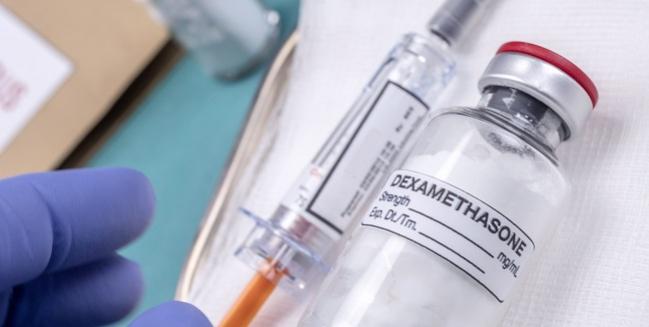Dexamethasone Cuts Death by One-Third in Ventilated COVID-19 Patients
Dexamethasone is “inexpensive, on the shelf, and can be used immediately to save lives,” says a RECOVERY researcher.

The use of the corticosteroid dexamethasone in COVID-19 patients on mechanical ventilation cuts the risk of all-cause mortality by roughly one-third, while also lowering the risk of death in patients requiring oxygen, according to early data from the RECOVERY trial.
Run by researchers from the University of Oxford, the RECOVERY trial is testing a range of treatments for patients with COVID-19, but the group announced on Tuesday they had closed enrollment to the dexamethasone arm after an early review of the data showed the steroid had a meaningful effect on clinical outcomes.
In total, 2,104 patients were randomized to dexamethasone 6 mg once daily for 10 days. When compared with usual care in 4,321 patients, the 28-day risk of death with dexamethasone was 35% lower in ventilated patients (P = 0.0003) and 20% lower in patients requiring oxygen (P = 0.002). Treatment with dexamethasone did not lower the risk of death in COVID-19 patients who did not require respiratory support.
In a press release announcing the results, Peter Horby, MD, PhD, who is leading RECOVERY along with Martin Landray, MBChB, PhD, called the mortality benefit an “extremely welcome result,” adding that dexamethasone is “inexpensive, on the shelf, and can be used immediately to save lives worldwide.”
It will be great news if dexamethasone, a cheap steroid, really does cut deaths by 1/3 in ventilated patients with COVID19, but after all the retractions and walk backs, it is unacceptable to tout study results by press release without releasing the paper. https://t.co/ZP5GVMUCW3
— Atul Gawande (@Atul_Gawande) June 16, 2020
Despite the positive news, the scientific community has been burned by COVID-19 research recently, and some physicians want to see the full paper before embracing dexamethasone. On Twitter, Atul Gawande, MD (Brigham and Women’s Hospital, Boston, MA), said: “It will be great news if dexamethasone, a cheap steroid, really does cut death by 1/3 in ventilated patients with COVID-19, but after all the retractions and walk backs, it is unacceptable to tout study results by press release without releasing the paper.” Tom Frieden, MD, former director of the Centers for Disease Control and Prevention, also said he wants to see the full study, noting that “other studies have not found this.” Others asked about the neurological outcomes of ventilated patients, data that were not available in the press announcement.
In their press release, the RECOVERY investigators acknowledge the public health importance of their findings and say they are now working on publishing their findings as soon as possible.
Some of this wary skepticism stems from the retraction earlier this month of two papers: one in the Lancet and one in the New England Journal of Medicine following questions over the integrity of their data. Authors of the two large, observational analyses ultimately apologized for not being able to verify the accuracy of research that had been rushed as swiftly as possible to print.
Michael O’Riordan is the Managing Editor for TCTMD. He completed his undergraduate degrees at Queen’s University in Kingston, ON, and…
Read Full BioSources
RECOVERY Trial. Low-cost dexamethasone reduces death by up to one third in hospitalized patients with severe respiratory complications of COVID-19. Published and Accessed on: June 16, 2020.


Comments